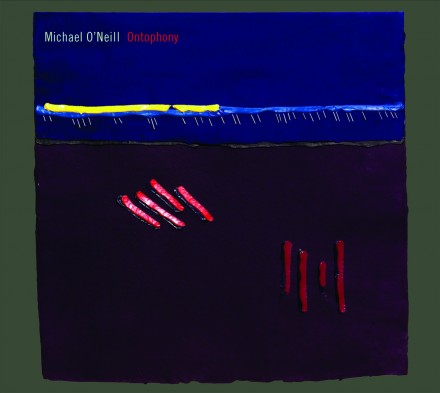Michael O'Neill
Ontophony
SGL SA2405-2“Imagine the amalgam of hurdy-gurdy drones, tablas, and Braxtonian Ghost Trance Music. Or think of a highly idiomatic LaMonte Young-styled expression, a music of eternal return played with vernacular instruments from two different cultures…Hypnotic, bewitching, unexpected.”
—Signal to Noise
Songlines is primarily a jazz label, but world music influences have often been a part of the music we produce, and every once in a while a local, purely world music project comes along that we just have to do. In fact Vancouver, with its great variety of immigrant and ethnic communities from Asia, Europe, Africa and Latin America, is a hotbed of world music activity, including many examples of cross-cultural music-making. Michael O’Neill is a classically trained composer and pianist who was drawn as a youth to the highland pipes and has been playing them ever since. Michael has also been involved since the ‘80s in composing and performing works for Javanese and Balinese gamelan – his “Lessons of the Garden” was featured on the 2004 Songlines release New Nectar by Vancouver’s Gamelan Madu Sari. And since 1995 he has been collaborating as a piper with the contemporary taiko group Uzume Taiko.
This record is the culmination of Michael’s interest in expanding the piping tradition into new realms of sound and expression – four works composed over the last 15 years for pipes and various percussion instruments (taiko, djembe, tabla, Tibetan and Chinese cymbals, etc.). Each piece takes a different approach. The earliest is “Horse of a Different Colour.” Michael describes it as “the most Philip Glass-influenced piece, with short motives repeated, but with as much dissonance as I could get out of the bagpipes at that time….I was also using hocketing devices that I think were in my mind from Balinese gamelan, creating a melody that travels note by note between the four bagpipes.”
Next came “Being and Doing,” a ceremonial or ritual work for pipes and Hare Krishna-style percussion in seven sections (tracks 1-7): “I was always fascinated with the pipes because you can walk and play them. I got the idea that I could make a piece that would mirror a walking journey through life, and that I could also speculate through music on the afterlife. I called the part about life Being, and the part about death or the beyond Doing. When I finished the whole Being section I realized that there could be no walking to it, because what I thought was simple to play wasn’t really. In the Doing section, the idea was to create a piece that was more about sustain and tuning than actually trying to get anywhere.” Half an hour long, “Being and Doing” is a grounded yet ecstatic musical meditation on inner and outer states of being, and the kind of direct experience of duration, stasis and change that only music can provide.
“Jedaya” is much more playful, but with a dark side too. “The piece was inspired by sailing trips in Georgia Strait, near Vancouver and Jedediah Island. One particularly blustery day we were all ‘hiked’ way out, desperately trying to counterbalance the tilt of the boat – that’s the kinetic effect I’m trying to recapture.” The hearty yet relentless 12/8 riffs and percussion outbursts might even evoke images from pirate movies. The dirge-like end section draws on “a sobering experience with an incompetent sailor who crashed the boat into the beach after turning it over in the lake.”
Finally and most recently, “Luffness” is a major collaborative piece for pipes and taiko (plus shakuhachi and didjeridu). Members of Uzume Taiko composed not only percussion parts but some of the pipe parts as well. It grew out of an image suggested by Scottish musician Phil Cunningham to Uzume in a bar in Aberdeen: a pipe band and a taiko group encountering each other on a misty moor. Some sections are rather lyrical, others are very dynamic and feature the different taiko drums extensively. A piping innovation here is the lowered drone note, creating a major scale by means of extensions to the drone pipes.
So within the apparently restricted expressive range of the bagpipes O’Neill has brought forth a wide variety of moods, the results of a passionate response to the unrealized potential of a deep tradition. For all their structural sophistication these are far from academic works, and his group Mearingstone will soon be touring the music to festivals in North America and Europe. As usual with Songlines, the high-res recording was mixed to stereo and 5.0, the surround mix adding a rather phenomenal extra dimension to the music.
Born in Calgary in 1955, Michael O’Neill has been based in Vancouver since 1982. His composition teachers include Gilles Tremblay, Martin Bartlett, Rudolf Komorous, and Barry Truax. He has written works for Vancouver’s Gamelan Madu Sari, Uzume Taiko, Silk Road Music, Simon Fraser University Pipe Band, Karen Jamieson Dance, and choreographer Crystal Pite, also for bass clarinetist Lori Freedman, Winnipeg’s Stirling Pipe Band, performance poet Sheri-D Wilson, Toronto’s Evergreen Club Contemporary Gamelan (“Metaforest and Field,” for bagpipes and gamelan), Maja Gender, and his own ensemble Mearingstone. Michael also performs in the Uzume Taiko Ensemble, Gamelan Madu Sari, and Gamelan Alligator Joy, and co-leads Maja Gender, a Balinese shadow play quartet which specializes in new music.
More info: Michael’s group Mearingstone, Uzume Taiko.
